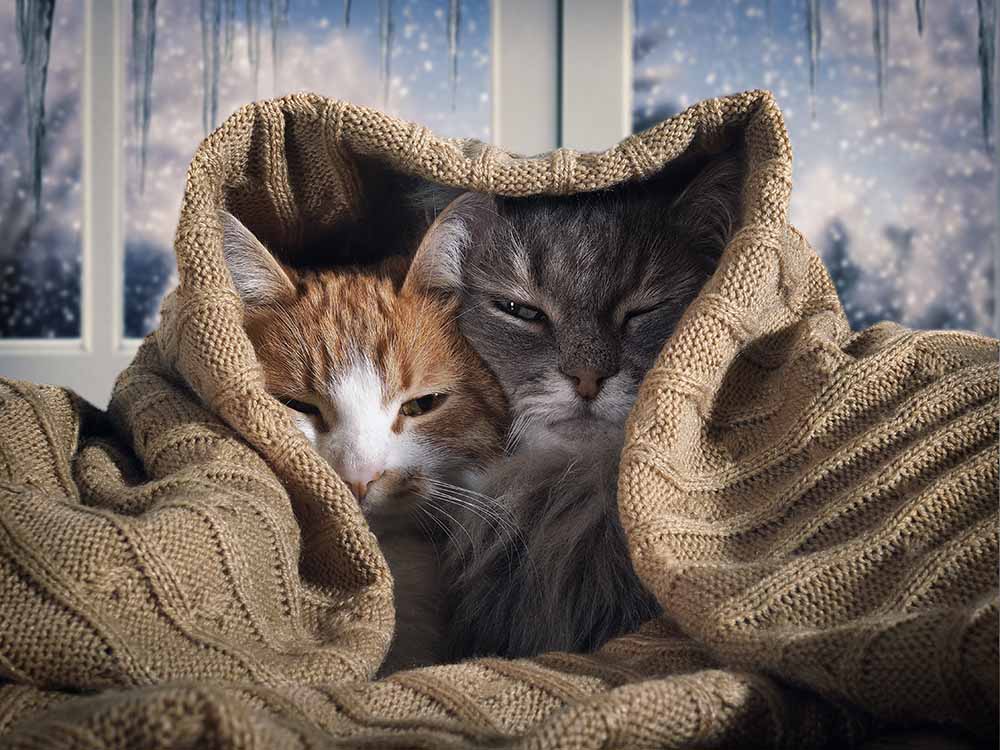What Happens to Bonded Cats When One Dies?
- August 30, 2021
- Celebrations of Life

Beloved feline companions can feel as if they become part of our family, so when it is their time to go, it can be immensely heartrending. Their loss can trigger an overwhelming number of difficult emotions in us and it can take time and emotional support from our loved ones to help us heal.
As we mend our broken hearts after the loss of our feline friend, you may be wondering how our cats who are left behind experience the deep loss of their own furry comrade. Bonded cats often form special relationships that can leave them devastated and grief-stricken after one of them passes away. As a cat owner, you’ll likely find yourself desperate to find some way to tend to and help your grieving cat heal and move on from their trauma.
Understand that it is normal for your cats to go through their own grieving process, and though it may take time, they will eventually be able to move on and adapt. As we continue to explore the experience of bonded cats when one passes away, we understand this may also be a time of great distress and despair for you. Even though this particular guide is geared towards helping your feline companion, we want you to know you are not alone and there are a handful of resources available to help you cope with your loss as well. As we encourage you to find help and emotional support, read on to learn ways you can help your feline friend cope through this difficult time.
Do Bonded Cats Become Depressed When One Dies?
It is a common sentiment that our feline friends aren’t always the most emotionally expressive creatures, and can sometimes seem stoic or simply unconcerned by most things in their surroundings. While cats are notorious for not being as blatantly affectionate or emotionally-driven as dogs, it doesn’t mean they lack feelings altogether and don’t grieve those they love. When a cat’s beloved companion passes away, they may become depressed and feel desolate from their loss.
Bonded cats that have been together for years can often suffer from depression and anxiety when separated or when one passes away. In fact, this is a common reason why animal shelters work so hard to find new owners for bonded cats who are willing to adopt both of them, knowing that the separation could be potentially devastating for both of them.
Unfortunately, there is not much that can be done to prevent a separation caused by the death of a bonded cat. In this instance, it’s best to immediately come to the support of your cat than wait and wonder whether your surviving cat has been affected by this loss or not. Try to look for signs of grief and pay close attention to any changes in your cat’s behavior to better assess their emotional state. Even if these signs are not present just yet, still consider offering emotional support and love to your cat as they begin to process the loss of their companion.
Signs That Your Feline Friend Is Grieving
While it is difficult to fully grasp a cat’s understanding of death, there are a few signals that can indicate that your feline friend is feeling hurt or distressed. Such signs may include, but are not limited to:
- Decrease in appetite
- Prolonged sleep or lethargy
- Constant hiding and / or staying away from people
- Lack of movement
- Intense mourning
Thankfully, time eventually heals most hurts and you can often expect these signs of your cat’s mourning to start to dissipate within a few weeks to around six months as they begin to adjust and move on. If you notice your grieving cat stops eating and drinking for more than 24 hours, or notice any other unusual patterns in their behavior, make sure to seek help from your veterinarian as soon as possible. A cat that stops eating for several days can be at risk of developing fatal liver disease and should be immediately cared for.
What Can You Do to Help Your Grieving Cat?
There are a number of things you can do to show your affection and tend to your grieving pet. Below are a few recommendations to help you offer emotional support to your cat to help them cope through this challenging time.
Spend extra time with your pet
Your feline friend will appreciate some quality time together after losing his or her life-long companion. This will help minimize any feelings of loneliness they may have and help them begin to adjust to their new life.
Invite other feline friends over
If your feline pet handles being around other cats well or enjoys their company, you may consider trying to increase their interaction with other potential feline companions. Make sure to always do so under close supervision to avoid any altercations or incidents.
Encourage eating
As changes in appetite are common after a bonded cat loses their companion, your surviving cat may appear to not be as excited or enthusiastic about eating their food anymore. If your cat is showing any disinterest in eating, it is important to encourage them to continue to eat. Consider going out of your way to give other foods to your beloved feline that he or she may enjoy or offer special or favorite treats during mealtime to ensure that your cat maintains a healthy appetite and diet.
Avoid new changes
Cats are creatures of habit and routine and tend to thrive while following a daily schedule. Keep in mind that as losing a cherished feline companion of their own was already a huge life change and adjustment for them, it is best to avoid introducing any new changes into their routine and to keep everything as usual as possible until they are further along in their grieving process. Therefore, this might not be the best time to offer them a new toy or food or introduce any major modifications into their life.
Limit Outdoor Access.
During a time of grieving you might want to limit your feline’s time outdoors, or if they are already an indoor/ outdoor cat or greatly enjoy being outside in nature, make sure you accompany them the whole time they are outside. This is due to the fact that bonded cats may go searching for their lost companion as if their feline friend has run away or gone missing, so keep your eye on your feline friend and make sure they stay close to you at all times.
Hope Beyond the Pain
Ultimately, a grieving cat will require a great deal of extra attention and reassurance during their grieving process, but eventually they will be able to adjust as time goes on. Making sure you are able to provide your feline friend with a healthy, safe and supportive environment during this period is crucial. Once you notice that your beloved feline companion is starting to move on from their loss, you may perhaps consider adopting a new animal partner for him or her when the time is right to once again introduce new pets into your home and into your current pets’ lives.
If you find yourself trying everything with your power to help your beloved feline cope, but nothing is helping to improve the situation, consult with your vet about your next options. Remember to be kind and patient to yourself as you help your feline friend adjust and recover from their trauma, as you may too be experiencing and grieving a tremendous loss of your own. It is important to allow both you and your feline friend time and space to heal and fully mend your broken hearts.
Related Articles

What Happens to Bonded Dogs When One Dies?
- August 12, 2022
- Celebrations of Life

What to Do When Your Pet Passes Away at Home
- July 24, 2021
- Planning

A Basic Guide to Pet Cremation
- June 21, 2021
- Planning

How to Cope with the Death of a Pet
- June 21, 2021
- Celebrations of Life
